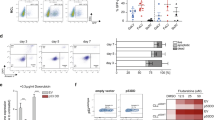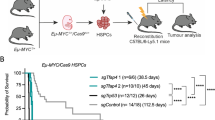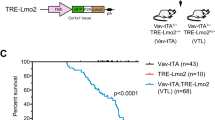Abstract
The NFKB-2 (Lyt-10) gene codes for an NF-κB-related transcription factor containing rel-polyG-ankyrin domains. Rearrangements of the NFKB-2 locus leading to the production of 3′ truncated NFKB-2 proteins are recurrently found in lymphoid neoplasms, particularly cutaneous lymphomas. Such mutant NFKB-2 proteins have lost the ability to repress transcription that is typical of NFKB-2 subunit p52, and function as constitutive transcriptional activators. To verify whether the expression of abnormal NFKB-2 proteins can lead to malignant transformations in mammalian cells, we transfected human lymphoblastoid cell lines and murine fibroblasts (Balb/3T3) with expression vectors carrying the cDNAs coding for normal NFKB-2p52, Lyt-10Cα or LB40 proteins, which are representative of the abnormal types found in lymphoma cases. The expression of both normal and mutant NFKB-2 proteins has a lethal effect on lymphoblastoid cells and a cytotoxic effect was also observed in murine fibroblasts. The fibroblast cell lines expressing Lyt-10Cα or LB40, but not those expressing normal NFKB-2p52, were capable of forming colonies in soft agar. The analysis of individual clones revealed that cloning efficiency correlated with the expression levels of the abnormal proteins. Injection of the Lyt-10Cα-transfected Balb cells in SCID mice led to tumor formation in all of the animals, whereas no tumors were observed in the mice injected with control or NFKB-2p52-transfected cells, thus indicating that abnormal NFKB-2 protein expression is tumorigenic in vivo. Our results show that mutant NFKB-2 proteins can lead to the transformed phenotype, and support the hypothesis that alterations in NFKB-2 genes may play a role in lymphomagenesis.
This is a preview of subscription content, access via your institution
Access options
Subscribe to this journal
Receive 50 print issues and online access
$259.00 per year
only $5.18 per issue
Buy this article
- Purchase on Springer Link
- Instant access to full article PDF
Prices may be subject to local taxes which are calculated during checkout
Similar content being viewed by others
Author information
Authors and Affiliations
Rights and permissions
About this article
Cite this article
Ciana, P., Neri, A., Cappellini, C. et al. Constitutive expression of lymphoma-associated NFKB-2/Lyt-10 proteins is tumorigenic in murine fibroblasts. Oncogene 14, 1805–1810 (1997). https://doi.org/10.1038/sj.onc.1201015
Received:
Revised:
Accepted:
Issue Date:
DOI: https://doi.org/10.1038/sj.onc.1201015
Keywords
This article is cited by
-
p52 signaling promotes cellular senescence
Cell & Bioscience (2022)
-
NF-kB2 induces senescence bypass in melanoma via a direct transcriptional activation of EZH2
Oncogene (2016)
-
A cell cycle regulatory network controlling NF-κB subunit activity and function
The EMBO Journal (2007)
-
Regulation of p53 tumour suppressor target gene expression by the p52 NF-κB subunit
The EMBO Journal (2006)
-
Mutations in the NF-κB signaling pathway: implications for human disease
Oncogene (2006)



